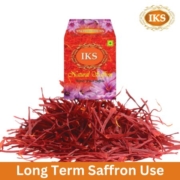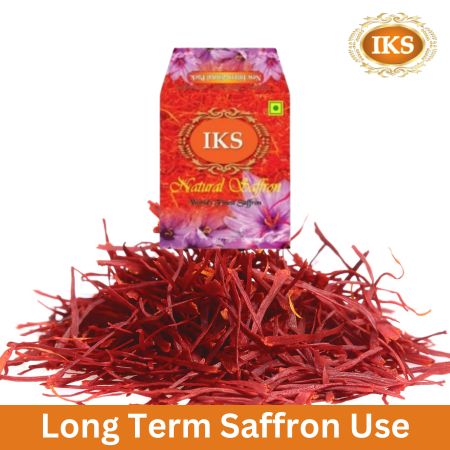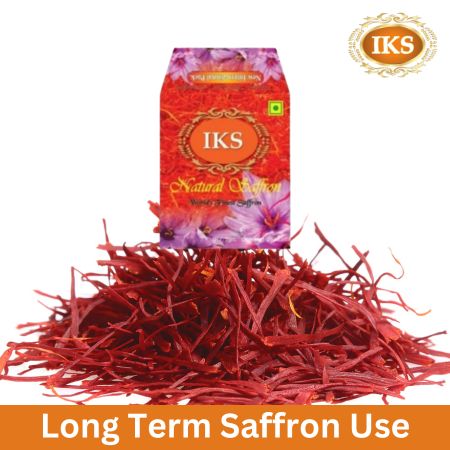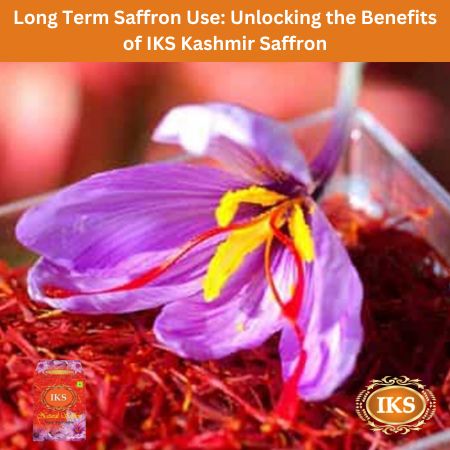Long Term Saffron Use: Unlocking the Benefits of IKS Kashmir Saffron
Long Term Saffron Use – Introduction
Long Term Saffron Use – Saffron, the world’s most expensive spice by weight, is derived from the flower of Crocus sativus. Known for its vibrant color, unique flavor, and numerous health benefits, saffron has been utilized in culinary, medicinal, and cultural practices for centuries.
Among the various types of saffron available, IKS Kashmir Saffron, sourced from the picturesque valleys of Kashmir, is renowned for its superior quality and potency. This detailed article will explore the long-term use of saffron, emphasizing its health benefits, potential risks, and the unique attributes of IKS Kashmir Saffron.
Experience the health benefits of saffron—buy Kashmiri Kesar online today!
Understanding Saffron: An Overview
a. What is Saffron?
Saffron is harvested from the stigma of the Crocus sativus flower. Each flower produces three red stigmas, which are hand-picked and dried to create the spice. The labor-intensive process of cultivation and harvesting contributes to saffron’s high market value.
b. The Unique Appeal of IKS Kashmir Saffron
IKS Kashmir Saffron is celebrated for its unparalleled quality, characterized by its deep red color, strong aroma, and distinct flavor. Grown in the saffron-rich regions of Kashmir, particularly in Pampore, this variety has a unique flavor profile and a higher concentration of bioactive compounds compared to saffron from other regions.
c. Nutritional and Chemical Composition
Saffron contains several bioactive compounds that contribute to its health benefits:
- Carotenoids: Such as crocin and zeaxanthin, which have antioxidant properties.
- Picrocrocin: Imparts the bitter flavor and is linked to mood enhancement.
- Safranal: Provides the characteristic aroma and has neuroprotective effects.
- B Vitamins and Minerals: Saffron also contains small amounts of vitamins like riboflavin and B6, as well as essential minerals like potassium and magnesium.
Unlock the secrets of wellness with Kashmiri Kesar. Purchase yours online now!
Health Benefits of Long-Term Saffron Use
a. Antioxidant Properties
Saffron is rich in antioxidants, which help combat oxidative stress in the body. Long-term consumption of saffron can enhance the body’s defense mechanisms against free radicals, reducing the risk of chronic diseases.
b. Mood Enhancement and Antidepressant Effects
Research has shown that saffron can have mood-lifting properties. Long-term use may increase the levels of serotonin and dopamine in the brain, which can help alleviate symptoms of depression and anxiety. Several studies have indicated that saffron is as effective as some conventional antidepressants in treating mild to moderate depression.
c. Cognitive Function and Memory Improvement
Saffron’s neuroprotective properties may support cognitive function and memory. Long-term use has been linked to improved learning and memory, with some studies suggesting that saffron may help delay the onset of neurodegenerative diseases like Alzheimer’s. The antioxidants in saffron protect brain cells from damage, promoting overall brain health.
d. Cardiovascular Health
Long-term saffron use may contribute to improved cardiovascular health. Saffron is known to help lower blood pressure, improve circulation, and reduce cholesterol levels. Its anti-inflammatory properties can also help reduce the risk of heart disease by preventing arterial plaque buildup.
e. Anti-Cancer Properties
Some preliminary research suggests that saffron may exhibit anti-cancer properties. The bioactive compounds in saffron have shown promise in inhibiting the growth of certain cancer cells in laboratory studies. Long-term use of saffron may lower the risk of specific cancers, although more extensive human studies are needed to validate these findings.
f. Eye Health
Saffron may play a role in maintaining eye health. Long-term consumption has been associated with a reduced risk of age-related macular degeneration (AMD) and improved vision. The carotenoids in saffron, especially crocin, are thought to protect retinal cells from oxidative stress.
g. Menstrual Health and Fertility
Saffron has been traditionally used to alleviate menstrual discomfort and regulate menstrual cycles. Long-term use may help reduce symptoms associated with premenstrual syndrome (PMS) and may also promote fertility by improving reproductive health in women.
h. Anti-Inflammatory Properties
Chronic inflammation is linked to various health issues, including heart disease and autoimmune disorders. Saffron’s anti-inflammatory properties may help reduce inflammation in the body, contributing to overall health improvements when consumed regularly over the long term.
i. Respiratory Health
Saffron has been used in traditional medicine to alleviate respiratory issues such as asthma and bronchitis. Its bronchodilatory effects may help ease breathing difficulties, making it a valuable addition to the diet for individuals with respiratory conditions.
Start your journey to better health with Kashmiri Kesar. Buy online now!
Specific Benefits of IKS Kashmir Saffron
a. Superior Quality and Potency
IKS Kashmir Saffron is known for its high crocin content, which enhances its antioxidant properties. The unique climate and soil conditions of Kashmir contribute to the superior quality of this saffron, making it more effective than saffron from other regions.
b. Traditional Uses in Ayurveda
In Ayurvedic medicine, IKS Kashmir Saffron has been used for centuries for its therapeutic properties. It is believed to balance the three doshas (Vata, Pitta, and Kapha) and is often prescribed for various ailments, including digestive issues, skin disorders, and stress relief.
c. Cultural Significance
IKS Kashmir Saffron holds cultural significance in Kashmir, often referred to as “red gold.” It is not only a culinary ingredient but also an integral part of Kashmiri weddings and festivals. The cultural heritage associated with this saffron adds to its allure and importance.
Risks and Considerations of Long-Term Saffron Use
a. Dosage Concerns
While saffron is safe in culinary amounts, excessive consumption can lead to toxicity. The recommended daily dosage is typically between 5 to 10 Saffron Strands (Threads). Long-term high doses may result in adverse effects, including nausea, vomiting, and diarrhea.
b. Allergic Reactions
Some individuals may experience allergic reactions to saffron, presenting as skin rashes, headaches, or gastrointestinal issues. Those with a history of allergies to other spices should approach saffron with caution.
c. Interactions with Medications
Saffron can interact with various medications, including antidepressants, blood thinners, and blood pressure medications. Individuals taking these medications should consult a healthcare professional before incorporating saffron into their long-term regimen.
d. Pregnancy and Breastfeeding
While saffron is generally considered safe in moderate amounts during pregnancy and breastfeeding, high doses may stimulate uterine contractions and should be avoided. Pregnant women should consult their healthcare provider before using saffron regularly.
e. Quality and Purity Concerns
Due to its high market value, saffron is often subject to adulteration. Long-term use of low-quality saffron can lead to unintended side effects. It is crucial to source saffron from reputable suppliers, such as IKS, to ensure purity and potency.
Indulge in the richness of Kashmiri Kesar—purchase online for premium quality!
How to Incorporate Saffron into Your Diet
a. Culinary Uses
Saffron can be added to a variety of dishes, enhancing flavor, color, and nutritional value:
- Rice Dishes: Saffron is commonly used in traditional dishes such as biryani and paella. Soaking saffron strands in warm water or broth before adding them to rice helps to release its flavor and color.
- Soups and Stews: Incorporate saffron into soups and stews for a rich flavor and vibrant hue.
- Beverages: Infuse saffron in teas, lattes, or warm milk for a soothing drink with potential health benefits.
- Desserts: Use saffron in desserts like saffron-infused rice pudding or milk-based sweets to add a unique flavor.
b. Saffron Supplements
For those seeking the health benefits of saffron without the culinary application, saffron supplements are available. However, it is essential to choose high-quality products and consult a healthcare provider for appropriate dosing.
c. Traditional Remedies
In traditional medicine, saffron is often used in various remedies. For instance, saffron-infused honey is believed to have numerous health benefits, including enhancing mood and improving digestion.
Conclusion
Long-term use of saffron, particularly IKS Kashmir Saffron, can offer a myriad of health benefits, ranging from mood enhancement to improved cardiovascular health. With its high concentration of bioactive compounds, IKS Kashmir Saffron stands out as a superior choice for those looking to incorporate saffron into their daily lives.
However, it is essential to approach its use thoughtfully, considering appropriate dosages and potential interactions with medications. By incorporating saffron into a balanced diet and maintaining awareness of its effects, individuals can enjoy the many advantages this remarkable spice has to offer while minimizing risks.
Always consult a healthcare professional before making significant changes to your dietary or health practices, particularly with long-term use of any supplement or spice.
In summary, saffron is not merely a spice but a treasure trove of health benefits, traditions, and cultural significance, particularly when sourced from the exquisite landscapes of Kashmir.










Leave a Reply
Want to join the discussion?Feel free to contribute!